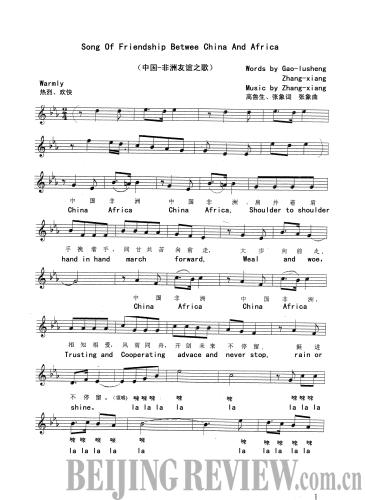|
 |
|
Song of China-Africa Friendship (COURTESY OF ZHANG XIANG) |
Living in the eastern port city of Tianjin, China, 76-year-old Zhang Xiang is a history professor at Nankai University. Although officially retired for many years, he has never really stopped working. He spends his days attending Africa-related activities, shuttling between locations like Beijing, Tianjin and Hubei Province. He is also obsessed with music, writing songs that blend Chinese and African elements. "I want to extend our two peoples' friendship through music," he says. His history is as layered as his daily life.
Musical luck
Zhang was raised in the northern Chinese province of Shanxi, known for its Chinese opera traditions. So enchanted was he by the art form, it inspired him to apply for music studies at a conservatory – the country's top academy, the Central Conservatory of Music (CCOM), then located in Tianjin. This was in the late 1950s.
The application process was much harder than he had anticipated, and Zhang was denied admission to CCOM. Luckily his musical talent did not go to waste: granted placement at Nankai University, he found his home as a student in the history department where he was elected head of the college's entertainment group, conducting its song and dance ensemble.
Then opportunity fell into Zhang's lap. Although he wasn't able to matriculate at CCOM, he was given the chance to attend a composition and conductor training class at the school. Through professional direction and guidance, he evolved from a music fan into a music expert.
An introduction to Africa
Becoming an African historian was not Zhang's plan. In 1961, after graduating, he stayed on at Nankai University as a lecturer. His superior appointed him to conduct studies on African history.
Much of Zhang's private time became dedicated to studying the continent. He began to take part in various seminars and meetings held by China's Institute of Afro-Asia Studies, the only institute of its kind at that time in China. In 1979, he became one of the founding members of the Chinese Society of African Historical Studies.
Nearly two decades had passed and he still had yet to visit Africa itself, something which he deeply regretted.
Going to Ghana
Eight years later, Zhang was invited to attend an international academic conference in Denver, Colorado. One of his research articles on Ghana, Africa's first independent country, had drawn the attention of American and African scholars. But when they realized that Zhang hadn't actually been to Africa, they lost interest in his research. Zhang was hit hard. He swore to himself he would travel to the continent one day.
In 1993, Zhang got his chance. Sponsored by then State Education Commission, he was appointed a visiting professor at the University of Ghana, teaching comparative studies on Chinese and African history. His classes were highly praised by Kwame Arhin, head of the university's Institute of African Studies, who described Zhang's lectures as giving a clear picture of China's complicated history.
The university had a music college. Zhang often brought Chinese albums there to share with teachers and students. He also learned about African music, which impressed him with its lively rhythms and vivid multiple beats. It was a change from Chinese music, which places more emphasis on melody.
More music
In the winter of 2006, the Third Forum on China-Africa Cooperation was held in Beijing. With Zhang's urging, a series of activities were held at Tianjin's universities. African students at Tianjin and Nankai universities were invited to watch his songs performed on stage. The same students spent January 1, 2007 making dumplings with Zhang at his home. "This time I truly [felt] the deep love of Chinese people for us. I must tell my family and friends when I return home," expressed one of the students.
A new year again has arrived, and Zhang Xiang has a new resolution: to produce an African music album. "The lyrics will be translated into English, French, Swahili and other African languages," he says. "I hope my songs can be heard in Africa, because it expresses an old Chinese man's deep feeling for Africa."

|